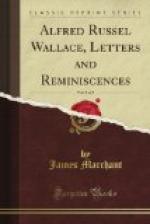It must also be remembered that children have not the same thorough knowledge of the names of the cards that we have, nor can they so rapidly and certainly count their numbers. This introduces another source of uncertainty which should be avoided in such experiments as these.
The same thing is still more clearly shown by the way in which objects are guessed by some prominent quality or resemblance, not by any likeness of name—as poker guessed for walking-stick, fork for pipe, something iron for knife, etc. And the total failure in the case of names of towns is clearly explained by the fact that these would convey no distinct idea or concrete image that could be easily described. These last failures really give an important clue to the nature of the faculty that is being investigated, since they show that it is not words or names that are read but thoughts or images that are perceived, and the certainty of the perception will depend upon the simple character of these images and the clearness and identity of the perception of them by the different persons present.
If these considerations are always kept in view, I feel sure that the experiments will be far more successful.
ALFRED E. WALLACE.
Sept. 6, 1881.
* * * * *
Wallace’s remarkable gifts as a lecturer are less widely known than his lucid and admirable style as a writer. Though Sir Wm. Barrett has heard a great number of eminent scientific men lecture, he considers that few could approach him for the simplicity, clearness and vigour of his exposition, which commanded the unflagging attention of every one of his hearers. Mr. Frederic Myers, no mean judge of literary merit, once said he thought Wallace one of the most lucid English writers and lecturers of his time. Prof. Barrett was anxious to induce Wallace to lecture in Dublin, and brought the matter before the Science Committee of the Royal Dublin Society, which arranges a course of afternoon lectures by distinguished men every spring. The Committee cordially supported the suggestion that Wallace should be invited to lecture, and the invitation was accepted. During his visit to Dublin, Wallace stayed with Prof. Barrett at Kingstown, and was busily engaged in revising the proof-sheets of his book on “Land Nationalisation” (1882).
In “My Life” (Vol. II., p. 334) Wallace says that among the eminent men whose “first acquaintance and valued friendship” he owed to a common interest in Spiritualism was Frederic Myers, whom he met first at some seances in London about the year 1878.
* * * * *
F.W.H. MYERS TO A.R. WALLACE
Leckhampton House, Cambridge. April 12, 1890.
My dear Wallace,—I will read your pamphlet[61] most carefully; will write and tell you how it affects me; and will in any case send it on with your letter and a letter of my own to Sir John Gorst, whom I know well, and whom I agree with you in regarding as the most acceptable member of the Government.




